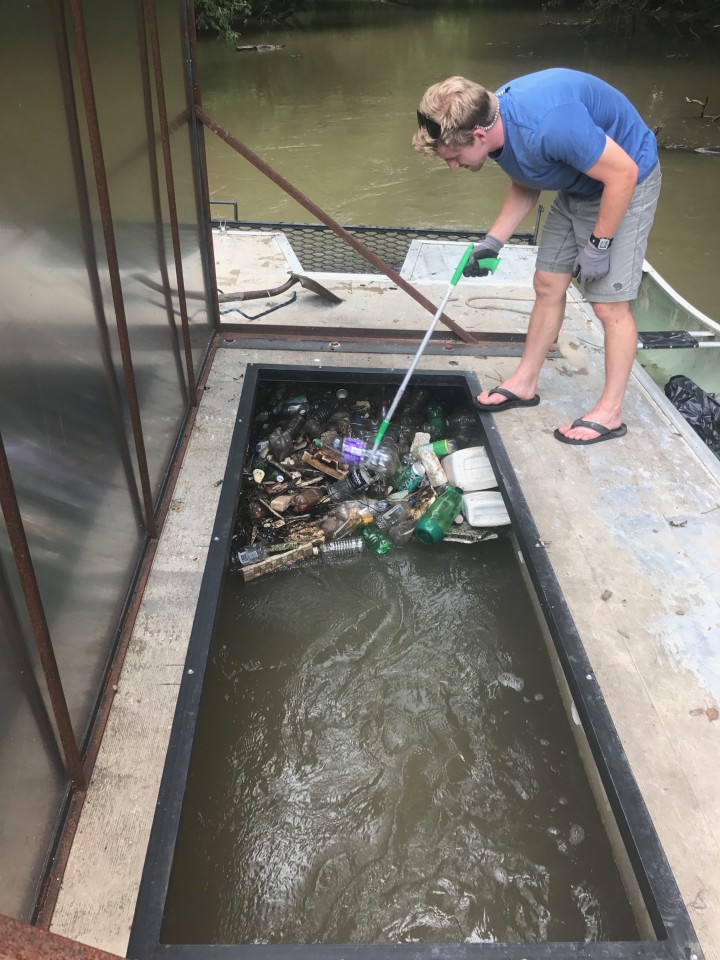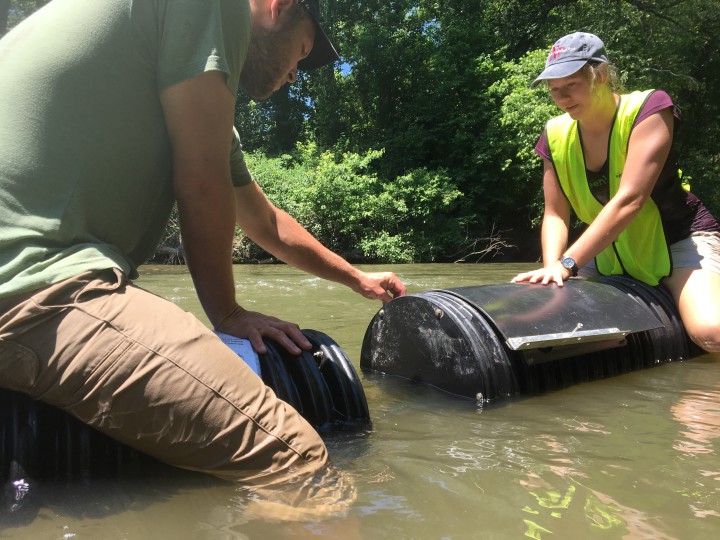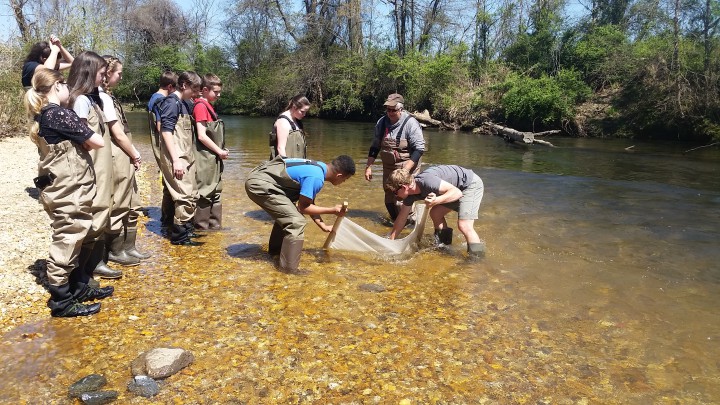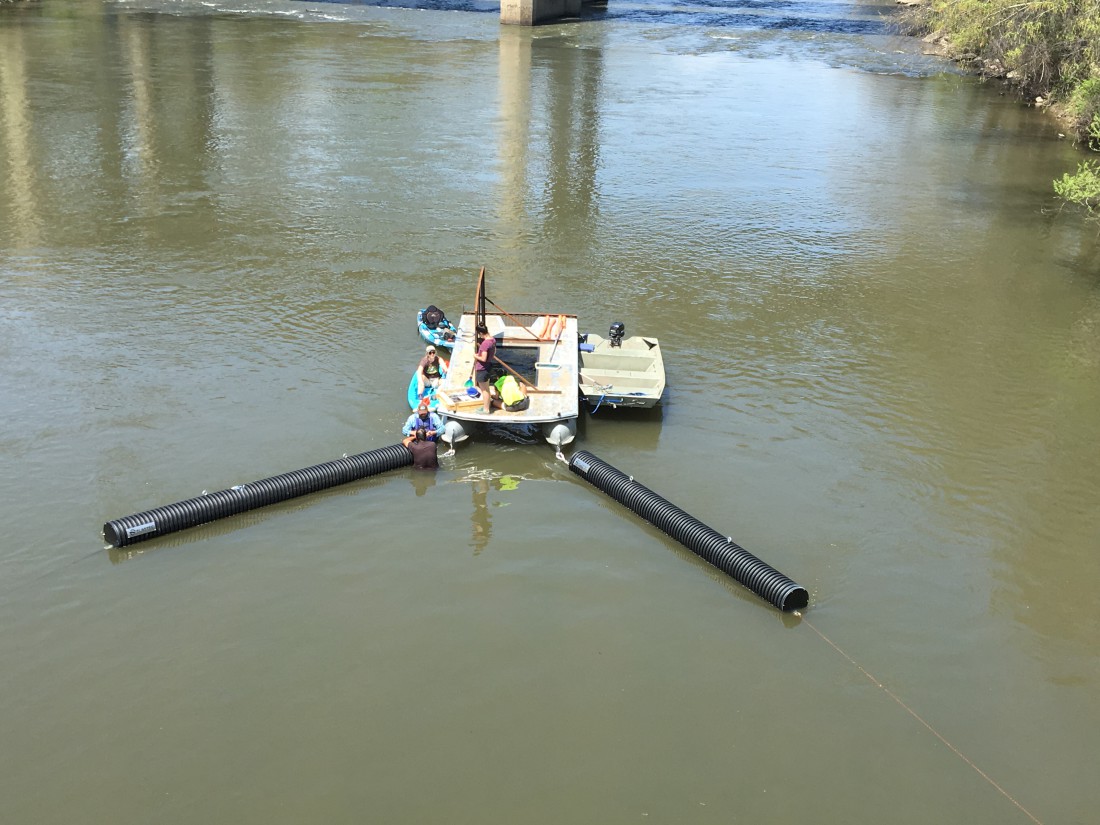Sunkist bottles, an inflatable raft and enough miscellaneous athletic equipment to fill a 50-gallon drum: Over the past year, all kinds of discarded flotsam have drifted into the gaping maw of the Trash Trout, a makeshift trash collector floating on Mud Creek in Hendersonville.
Created by the environmental nonprofit Asheville GreenWorks, the contraption has a simple design: Trash carried downstream by the current is guided between two sturdy, plastic arms into a mesh net attached to a pontoon boat in the center of the creek.
“It’s pretty slick,” says Dawn Chavez, the executive director of Asheville GreenWorks. Last year, the large funnel scooped up 1,000 pounds of trash in just four months. “When you can have something that’s just always in place 24 hours a day, seven days a week, it really adds up,” Chavez says.

The organization constructed the floating net with the help of money it received from the Pigeon River Fund, a pool of grant funding established in 1994 to mitigate the environmental impact of a hydroelectric dam on the Pigeon River.
Since then, the fund, which is administered by the Community Foundation of Western North Carolina and powered by Duke Energy, has distributed almost $7 million to nonprofit groups organizing projects in the service area of the former Carolina Power & Light Co., which encompasses Buncombe, Madison and Haywood counties, as well as the town of Fletcher in Henderson County. In mid-May, the fund announced the recipients of its most recent cycle of funding, awarding $217,010 to nine organizations.
Of that funding, about $22,000 will help Asheville GreenWorks build another Trash Trout on Hominy Creek, which is the second-largest tributary of the French Broad River in Buncombe County.
Asheville GreenWorks’ Eric Bradford says the creek travels through a heavily urbanized part of the county and catches a lot of the trash that’s carried downhill by runoff.
“The Hominy Creek, we’ve been cleaning it up for 45 years …, so we know where the trash is coming from,” Bradford said. “Now we have a device that that we can plug into the creek that’s going to capture this trash for us.”
Where it all began
In 1994, Carolina Power & Light Co. ― which, through various corporate reorganizations and mergers, eventually became Duke Energy Progress ― was seeking a new 40-year license from the Federal Energy Regulatory Commission to continue to operate and maintain the Walters Hydroelectric Project, which is located on the Pigeon River near the North Carolina/Tennessee border.
The project was developed in the 1920s to provide power and flood management support to rural parts of Western North Carolina and downstream areas of eastern Tennessee, says Duke communications consultant Kim Crawford.
The 108-megawatt project is the largest hydroelectric plant Duke Energy operates in WNC.

The license was granted, but it came with some conditions.
On top of regular payments to the newly created Pigeon River Fund, the license requires Duke to maintain a continuous minimum flow release from the station as well as assess water quality and the health of aquatic invertebrates and fish.
The Walters Dam isn’t the only environmental concern associated with industrial use of the Pigeon River. The former Champion International Paper Mill in Canton discharged significant amounts of industrial pollutants into the river for decades, a practice the federal permit says deposited dioxin-contaminated sediment in Waterville Lake above the dam. The 1994 license limits drawdowns of the lake to minimize the amount of contaminated sediment that could become suspended in the water.
“The federal license strikes a balance between providing electric generation and protecting the environment,” Crawford says.
According to an Asheville Citizen-Times article published on Dec. 9, 1994, the license required Carolina Power and Light (now Duke Energy) to provide $1 million in the first year to the fund followed by a series of smaller annual payments for the duration of the license.
Starting in 1995, the station has also conducted scheduled releases from the Walters power house, which Crawford says provides predictable flows for paddlers who take trips to Pigeon River rafting businesses that operate along the stream. In 2017, she says, 200,000 rafters, canoeists and kayakers spent time on Pigeon River.
Decisions, decisions
The Community Foundation of Western North Carolina awards grants through the Pigeon River Fund twice per year ― once in March and once in September.
In a given year, $400,000 to $500,000 will be awarded through the fund, says senior program officer Tara Scholtz. Organizations can submit applications online during the six-week application period. Scholtz vets each funding application and passes the approved applications to the eight-member Pigeon River Fund Advisory Committee, whose members are appointed by the N.C. Department of Environmental Quality. Most projects will also receive a site visit before the advisory committee makes its final decision.
In order for organizations to receive money from the Pigeon River Fund, they must present a project that meets at least one of the program’s four objectives: improving surface water quality, enhancing fish and wildlife management habitats, expanding public use and access to waterways, and increasing citizens’ awareness about their roles in protecting their resources.
“It doesn’t have to do all of these,” Scholtz says. “It needs to do at least one of them.”
Practical application
RiverLink, another environmental nonprofit based in Asheville, received $26,000 from the Pigeon River Fund this year to help expand its watershed education program, which gives students in third through eighth grades an opportunity to learn about aquatic ecosystems firsthand.
“Oftentimes classrooms are limited by time or accessibility,” says Justin Young, the program manager for RiverLink, “and so we were trying to come up with ways to bring the stream into the classroom for them.”
The money that the organization has received this grant cycle will help pay for seven dissecting microscopes; a portable stream table, which produces a miniaturized water system to demonstrate the dynamics of streams and rivers; and a backpack electrofisher, a tool that gives a light shock to fish so that researchers can take inventory of aquatic populations.

Garrett Artz, the executive director of RiverLink, says the organization receives a significant amount of funding from the N.C. Clean Water Management Trust Fund, which offers upwards of several hundred thousand dollars in funding compared to the Pigeon River Fund’s typical range of $5,000 to $35,000.
But the Pigeon River Fund does play an important role in expanding the organization’s funding capacity, supplementing the matches RiverLink must provide to receive funding from the state.
“Sometimes we may not be able to reach for those several hundred thousand dollars if we didn’t have the Pigeon River Fund there to support us on those important matches,” Artz says.
In past cycles, Asheville GreenWorks has used the funding to foster its Youth Environmental Leadership Program, which recruits youths from low-income communities to participate in water quality testing, educational programs and environmental cleanups.
As with other competitive grants, Chavez says, organizations are never guaranteed money from the Pigeon River Fund from one cycle to the next.
“They do a site visit with us and we have to make sure that we justify why this is a fundable project and why they should support it,” she says, “so we’re always happy when we do receive the funding.”



Before you comment
The comments section is here to provide a platform for civil dialogue on the issues we face together as a local community. Xpress is committed to offering this platform for all voices, but when the tone of the discussion gets nasty or strays off topic, we believe many people choose not to participate. Xpress editors are determined to moderate comments to ensure a constructive interchange is maintained. All comments judged not to be in keeping with the spirit of civil discourse will be removed and repeat violators will be banned. See here for our terms of service. Thank you for being part of this effort to promote respectful discussion.